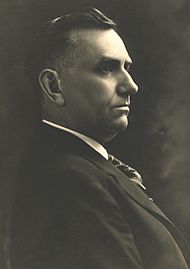Albert H. Roberts
| Albert H. Roberts | |
|---|---|
 |
|
| 33rd Governor of Tennessee | |
|
In office January 15, 1919 – January 15, 1921 |
|
| Preceded by | Thomas Clarke Rye |
| Succeeded by | Alfred A. Taylor |
| Personal details | |
| Born |
July 4, 1868 Overton County, Tennessee |
| Died | June 25, 1946 (aged 77) Nashville, Tennessee |
| Resting place | Good Hope Cemetery Livingston, Tennessee |
| Political party | Democratic |
| Spouse(s) | Nora Dean Bowden (m. 1889) |
| Alma mater | Hiwassee College |
| Profession | Attorney, educator |
Albert Houston Roberts (July 4, 1868 – June 25, 1946) was an American politician, educator, and jurist. He served as Governor of Tennessee from 1919 to 1921, having previously served as a state court judge and as principal of the Alpine Institute. He is best remembered for calling the special session of the Tennessee General Assembly that ratified the 19th Amendment, which gave women the right to vote, in August 1920. Roberts' support for the amendment and his unpopular tax reform initiatives divided the state Democratic Party and doomed his reelection chances.
Roberts was born in the Alpine community in Overton County, Tennessee, the son of John and Sarah (Carlock) Roberts. In 1881, his family moved to Columbus, Kansas. He returned to Tennessee in 1886, however, where he attended Hiwassee College in Madisonville, earning his B.A. in 1889. In 1891, he became principal of the Alpine Academy in his native Overton County. He changed the school's name to "Alpine Institute."
Roberts was admitted to the bar in 1894, and practiced law in the nearby county seat, Livingston. In 1910, he was elected Chancellor of the Fourth Judicial District, which covered fifteen Middle Tennessee counties. He served as an advisor to Benton McMillin's unsuccessful 1912 gubernatorial campaign, and unsuccessfully sought the Democratic Party's nomination for governor in 1914, losing to Tom Rye.
In 1918, Roberts again sought the Democratic nomination for governor in hopes of succeeding Governor Rye, who was not running for reelection. His opponent for the nomination was former state legislator Austin Peay. Roberts gained the support of party bosses E. H. Crump, Hilary Howse, and Nashville Banner publisher E. B. Stahlman, and defeated Peay in the primary by 12,000 votes. In the general election, Roberts defeated Knoxville judge Hugh B. Lindsay, 98,628 votes to 59,518 (turnout is believed to have been influenced by that year's flu epidemic).
...
Wikipedia
